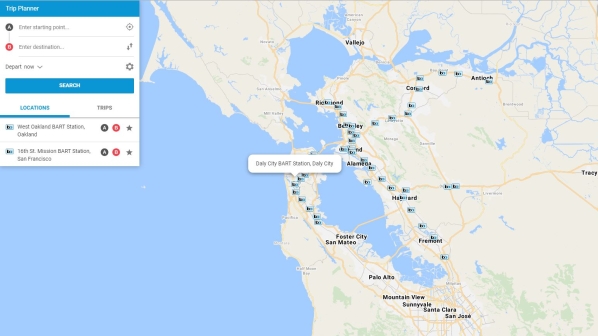Bart Trip Planner is available both online and on iOS and Android, and includes real-time information as opposed to the legacy system which relied on the scheduled timetable.
As well as Bart’s services, HaCon’s software processes transit data from more than 30 operators, including buses, trains, ferries, and cable cars. The planner also takes into account walking, cycling and car routes, including the current traffic situation in order to give users a realistic comparison for their commute. HaCon has also integrated park and ride and bike and ride options, including information regarding car parking and bike storage availability at the Bart stations.
Over the next phases of the project, HaCon and Bart plan to begin to offer even more transport modes, such as ride and bike sharing.
HaCon has integrated its HIM tool for disruption management into the service, which Bart says will allow it to respond to disruptions more quickly and more accurately. Service advisories and alerts such as station closures, bus replacement services, station or trip-related messages will be communicated in real time, allowing the planner to re-route passengers in accordance with potential service changes.
The step-by-step navigation feature factors in personal preferences like favourite modes of transport, and also displays train load information giving passengers the opportunity to pick less crowded trains.
“The new Trip Planner takes the hassle out of commuting because it provides a complete look at someone’s journey and offers a variety of ways to avoid traffic,” says Bart chief information officer, Mr Ravi Misra. “All trips use Bart as the lynchpin of the itinerary and then make it easy to get to and from our stations using the various modes of transport the Bay Area offers.”
“With its forward-thinking approach to offering multimodal travel chains, Bart is one of the first United States transit agencies to provide complete end-to-end itineraries,” says HaCon CEO, Mr Michael Frankenberg. “The new Bart Trip Planner is one of the first big steps into Mobility as a Service (MaaS) in the United States.”
In September last year, HaCon and online trip planner Rejseplanen unveiled a new multimodal MaaS app for Denmark which allows passengers to book tickets for various travel options including rail, metro, a self-driving shuttle bus, ferries and ride-sharing services.
For an in-depth look at how Smart Cities could change the way we travel, see the February issue of IRJ.

